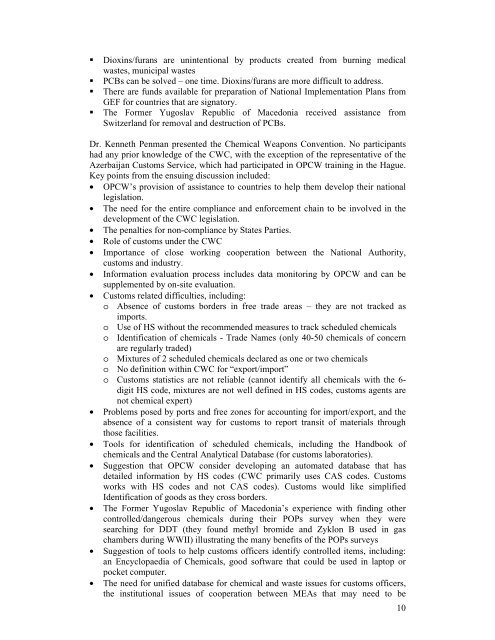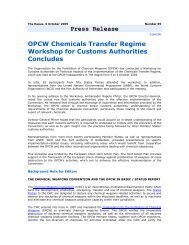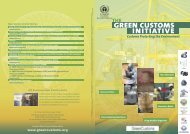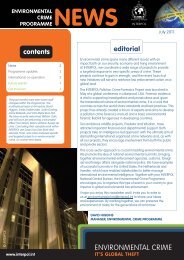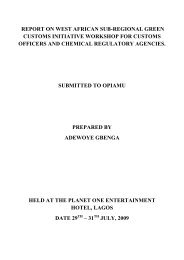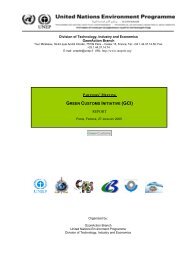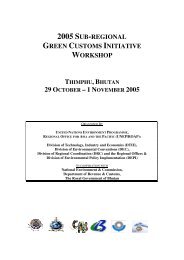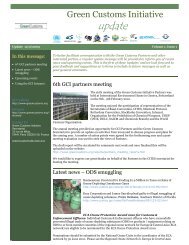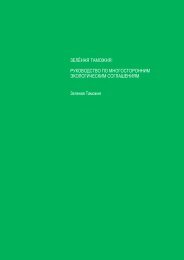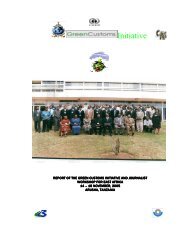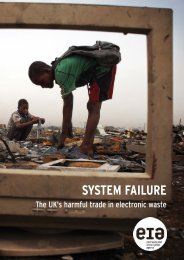Tbilisi - Green Customs Initiative
Tbilisi - Green Customs Initiative
Tbilisi - Green Customs Initiative
Create successful ePaper yourself
Turn your PDF publications into a flip-book with our unique Google optimized e-Paper software.
Dioxins/furans are unintentional by products created from burning medicalwastes, municipal wastesPCBs can be solved – one time. Dioxins/furans are more difficult to address.There are funds available for preparation of National Implementation Plans fromGEF for countries that are signatory.The Former Yugoslav Republic of Macedonia received assistance fromSwitzerland for removal and destruction of PCBs.Dr. Kenneth Penman presented the Chemical Weapons Convention. No participantshad any prior knowledge of the CWC, with the exception of the representative of theAzerbaijan <strong>Customs</strong> Service, which had participated in OPCW training in the Hague.Key points from the ensuing discussion included:• OPCW’s provision of assistance to countries to help them develop their nationallegislation.• The need for the entire compliance and enforcement chain to be involved in thedevelopment of the CWC legislation.• The penalties for non-compliance by States Parties.• Role of customs under the CWC• Importance of close working cooperation between the National Authority,customs and industry.• Information evaluation process includes data monitoring by OPCW and can besupplemented by on-site evaluation.• <strong>Customs</strong> related difficulties, including:o Absence of customs borders in free trade areas – they are not tracked asimports.o Use of HS without the recommended measures to track scheduled chemicalso Identification of chemicals - Trade Names (only 40-50 chemicals of concernare regularly traded)o Mixtures of 2 scheduled chemicals declared as one or two chemicalso No definition within CWC for “export/import”o <strong>Customs</strong> statistics are not reliable (cannot identify all chemicals with the 6-digit HS code, mixtures are not well defined in HS codes, customs agents arenot chemical expert)• Problems posed by ports and free zones for accounting for import/export, and theabsence of a consistent way for customs to report transit of materials throughthose facilities.• Tools for identification of scheduled chemicals, including the Handbook ofchemicals and the Central Analytical Database (for customs laboratories).• Suggestion that OPCW consider developing an automated database that hasdetailed information by HS codes (CWC primarily uses CAS codes. <strong>Customs</strong>works with HS codes and not CAS codes). <strong>Customs</strong> would like simplifiedIdentification of goods as they cross borders.• The Former Yugoslav Republic of Macedonia’s experience with finding othercontrolled/dangerous chemicals during their POPs survey when they weresearching for DDT (they found methyl bromide and Zyklon B used in gaschambers during WWII) illustrating the many benefits of the POPs surveys• Suggestion of tools to help customs officers identify controlled items, including:an Encyclopaedia of Chemicals, good software that could be used in laptop orpocket computer.• The need for unified database for chemical and waste issues for customs officers,the institutional issues of cooperation between MEAs that may need to be10


